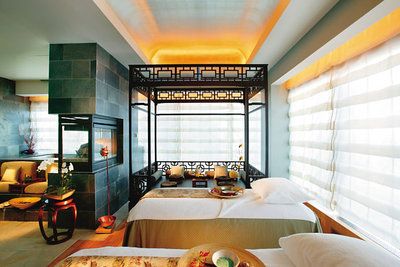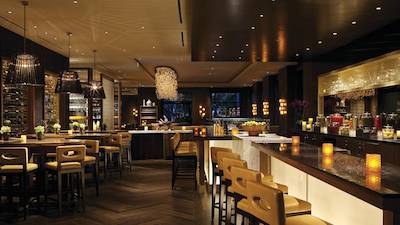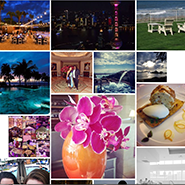When luxury consumers are deciding where to stay as they travel, reviews posted online have more influence than similar appraisals delivered in magazines, newspapers or television, according to a new report from Unity Marketing.
Similarly, advertisements for travel experiences that run in print or on television make less impact than reviews. Since online reviews from other customers pull more weight than even word of mouth from friends and family, hospitality brands need to find ways to give their guests a voice online.
“Those who want to attract the luxury traveler need to focus on ways to get their guests to post reviews or user-generated-content," said Pam Danziger, president of Unity Marketing, Stevens, PA.
"A story from an actual guest is compelling, so travel marketers need to manage their word-of-mouth marketing efforts,” she said.
Unity Marketing’s “The Ultimate Guide to Winning the Hearts & Dollars of Today’s Affluent Traveler” report takes information from its surveys of luxury consumers conducted every three months. Affluent luxury consumers are in the top 20 percent of income and have purchased luxury goods in at least one category, and Unity over samples ultra-affluent individuals, with income of at least $250,000 so their responses make up a larger percentage of the data.
Rest and relaxation
Affluent consumers are looking for three main things when traveling: relaxation, sightseeing and fine dining. Travel brands can emphasize these experiences in their marketing efforts to attract these consumers.

VIP suite at the spa at Mandarin Oriental, New York
High-net-worth individuals and ultra-affluents have the most spending power, but they are also the most demanding when it comes to travel. Therefore, hospitality and service need to be at superior levels.
One of the ways to appeal to this audience is through concierge services. Ms. Danziger mentioned Quintessentially, Pure Entertainment Group and Bon Vivant as examples of companies that help this customer.
Luxury lifestyle management and concierge service provider Quintessentially Lifestyle recently ensured that members have access to its exclusive benefits with a new mobile application.
The app connects Quintessentially Lifestyle members to the service’s Lifestyle Assistants to access a wealth of knowledge ranging from nightclub and restaurant recommendations to obtaining last-minute concert tickets (see story).
Next generation
Reaching out to younger consumers, who will be the affluent consumers of tomorrow, is important to travel brands' success.
Millennials are more likely than other age groups to seek out hotels with luxury services, according to a survey by Chase Card Services.
Thirty-two percent of millennials said that dry cleaning is a key consideration when searching for accommodation, 30 percent cited massage or spa services and 23 percent look for pet-friendliness. While luxury hotels provide or can easily arrange to meet these demands, knowing the hierarchy of preferences can allow for more tailored experiences (see story).
Millennials also get the most enjoyment out of experiences, with travel, fine dining and gourmet food topping the list. On an index where 100 is average, travel and hotels were rated 156.
However, many are not acquainted with the luxury travel experience. Hotels can provide an introduction through local deals, offering discounts for staycations at a property or drawing them to their on-site restaurants.
For instance, included in the Four Seasons Beverly Hills’ redesign was the addition of a restaurant and lounge that would appeal to a younger crowd.

Culina restaurant at the Four Season Beverly Hills
Four Seasons Hotels & Resorts also took its culinary skills to the road with a food truck that toured three states and covered 1,000 miles beginning Sept. 16 last year.
The FS Taste Truck featured different Four Seasons chefs working together or against one another and the cuisine varied depending on location. The informal nature of food trucks may have allowed the brand to entice consumers who may not have considered traveling to a Four Seasons property beforehand, as well as introducing the brand to a younger consumer set (see story).
Millennials will be luxury hotels’ core consumers in the future, so brands should begin courting them today.
"Very simply, the millennials are the next generation of luxury travelers, set to make a really strong impact due to rising affluence in 2026-2029, marketers need to be planning for their arrival now," Ms. Danziger said.
"As of yet, they haven’t yet reached affluence, but bonds forged with this generation today will likely carry on into the future," she said. "Needless to say, in a recent survey among affluent millennials, we found that travel is number one in delivering personal satisfaction and happiness."
Online marketing will be critical to reaching these consumers. Using social media and blogs is also an effective approach to targeting young HENRYs (high earners not yet rich), who are on their way to ultra-affluence.
"In 2013 Facebook analyzed the types of memories shared on its members’ sites and reported that travel stores comprised 42 percent of posts on an average user’s timeline," Ms. Danziger said. "For this younger generation, the world is smaller.
"These young people are much more interested in visiting more places and wandering further and farther than any previous generation."
Final Take
Sarah Jones, editorial assistant on Luxury Daily, New York
{"ct":"AtYgnxCbE4A0M9eau\/a8WfdztvP3ega2yXXcC\/7x8JZmv97pA1Sw++SIYokzjDq2mp1WarP99UzrRRjxJHG5W2IFNn4EcxSQu8WKmXQAMCWfZeOYcIiMuw4Cr0hhDQMoFXZyz6dvVkIbukE\/\/LmOTAL5EdjmJmqL\/3fcIUIkN7hfBRmEJeJoYB9mqdAK6zo194UuT67uxHpDIQ6rnQ6jfLKec8DHLYKqCFSqgg1FiP9yqRXK0slYAosM6GzvQIT5aDdyyAxKcfLLb1IxLWq+qMeZImS964Jw8svh4E2uIr0oRpY9kN1pAyp5zhJdyAT\/pRatuAKXMK9Ll6nqSukBVtDG3uhtsSJm7VnvmKPRvLF2Yr14A8mh5Uq4Gy6N9SZeM4Hrhbc6WKuzv9bMtiA\/aUyjVRSvyoRO\/vIMPdxN2+Hr+BHUsXX4GC64Aa6ngConpaUAh4yTF46tRv1DHft+gXzrDskkFpp3dqhtdD\/C\/uuxD8XHnsXebxEdlAzCml7RdfWUpRJ4WDkEOLGXktsbwRY64IdyKvaIAT9SV4xK01AsOCrHPw+WZ5\/CEr1CtSZYTIDaVn\/mIcsxM3W0TPzkD9Kgya7reE1uiW\/FQGcLO4ft4Y6xbOFYemP84XJGTXxNIieHeK6hv9vTg90VAxI36FIfgjJLoE6xZff3fKbLStEVbJ7fCTbJSGdFcId7fPWKIoppc6nVz\/O2ZTApEM5FXLbGpmKPvfiCbjFZCHiJUTRvZcgnkqBWcE1p55ohCdThRTkRYq8Z34r6E5TvGBmh43wQ5lmj6ZR+ZgtZAQM2TMLPZ78yMsJIXUtWeM3s16boInOCW76x9K5dwdb2fF0ARK4vNQ9GG+nEJ7ymtHUO132LAWtP71IXED6z1KuEeYx68Zc5bVu+XrY9FPuC55br449SRG83CVd8EtCbmetMzMhK1O7XHJqQqAMV6yaG3BLfE48Ix2216+n6dJVwIvSEDReI9NF5VwGOk+96gKok3WjJcruxzt7aUJfW9TppM9vkl2CWYP37I2H1dVbzTyCbaUSJaW73OHgOHZjfJLT8G8qwxUJ5HQyAZDtQ3K59eiOIW1TVvN1GBt2ZGKRRR31ipiq7fsM5JGcIqEQVXpjglT8rnCpbSLlJV+HlXGA8MtZ+HZhrcrerZIE3e7TnYZwFi4TsPMiikA9zeOvAQPtKcTcg0cc3KZIm1bhnZKp2sAreL8zMxCS89mfhq3gYpXawcn+vyMObbJBVOxpFgKxV5z+0h9LPaeB8ELEanGmzQqkPtDuDbDsqm+gqWYajLRXPpg8FNj\/fIwq48T+l1egpNljlre0gS30ha7PYRTkCwNXHfcug4ksQl9gJ39Oi5qWy3ImuThi50RMbITby1h4MjH02P4kZi05\/buQ+3Z5Pga8cwfyGqOiclib3njLYb3DMEtArmKwueoxOebTOMXJqnZbpZW6fmUEkDTeCvJ5vA+4x3pWeFUAT\/lX\/zYJjGOG\/FUPf+m4R1T2McgTQ8nQi2hl19C5EC1VjjgHSCO0afLsKLbjXlSs2Z2e3uTntHBPykier0UJeiUYYdcUcdiL70h8rp2k0xal5Cyboy+KX0pvOVzuJ8noZFH3cK+v1lZeacgAfR+93OnT3CgM\/R0T50vPbmKIlNB2640Lc2Oin03LaN2WOisWnEAf0nQMHQlB5HsJvyyFPGw5Dmfg56bZk8ILi77CgT80sM0pNH8uNR\/XgGvdV+IYD98L\/mUd6pmpeWNCfBDZzR1NfurYtLhcWoWJI6VgMH\/b+yLNQw3U3qJPj\/ObgnUEkPTrN59t35QfRKU25hTeKA\/BZgetQq7CF0by5ePf7Tsz2dZcoOjI0BWEjAKUJTXojAaypZNRBQECr0Ruty9D9ildx5L6h76DBEdY1YoHKbUOQvT9zk8MmVKEMeNhyp5+pI7n81Q4SEEl9rOX5W7Al8X4AhH1tTz0MoonAA5YtmlnrFT3WlkA2kcNG99BjlGUog\/QFdeC\/ZJ8rGCe1wy\/noc16\/beIXzIDHKTdWRwPg0Pu1v19iPQbdM0PBpVMB6twd2NhzPecUFf8lFBu6tZ9qhrTUXm8zVUpTgGdzCufOhjjqjch8oZHnnhQkwKq7a+kKkJ5nRVbgcvgQWlUkY7DkxBoR85crvqHWrIGE40w72A08myt0GRwiiqoQhz\/bhSw+wjx4xE42BtIc9joK55BX9jvoycyIVK4wExg0llEjyZV51jGjmUcDo9SJ\/OV1KYw39GDHeNMMqVHjthu0thzHzEIwQzHMlJlZeOLz4i6eW8Nsi\/oNTV+qw8Z43JZweDfjsBP1rRD\/cfJXhdaMTYPjb6uUQHPZaeWa6SSNDLqJVti+0bCF0dPrt\/Es8NLNxoFPkAyBf75XM9\/QS7xtECHsJjxXydOcjfR5oLbsz7vk7naobAMdNAAIti9GO459POKb2aLFszRFbWFKbtSH48tJsOTH7EsrT3HGHfbwbgv+LpyPtfF46+HRFi25J03rdZfV22kJVMHKbLP7JZi6styQtYipE51AnCjnTeY0jjLzMUwouDvmKWKCcLUU68uYo\/ndQNa2XvT7VGO4AhNQqPexnWn8IYpcygUb52EGO7aOXRIjcSewtpgFt20qE\/zLTHiJiM0c9WwT0\/qh7a6r6fRT1meNj7kAVPiT4twdoS0Y6Hlcgra35PZY4JWcK96YKrb8luX7tCwwZMHhWHf1bDDxNWUiyfJlQ1dK2UUph45wQpmxEYxaIUuofVJuxbPkTIQ7D7VoLfEjCwOVGlJYwkkvg3FKNy+DXbhCrOYyipnXJG\/7bOVsASYA9wm4dguhWROWWQXsF1AWgJYJJTbu4DdNHItZwjp\/ap1A1+sb7m\/kVhK1rFTZkWUzKUN7QFbJ7eDKsIfcERQZSnQgEOkneH+qIHYnO4qRQGd\/HCXdQSwivI+WUlpFDqu6CW4UvFraxKKV0B\/W2mySJUWDlOOkXNIji8XgWN3473L\/ymUy3wdWgjaB6jVhc2Lc6NrFUg7cYESiyAtve8fxybYgWEorUpl\/y19ODuGMCb86VjmmHtX+5aq9IFywxoP2T70Uv1pgE1G7y978\/oF2bgEXFZEvPbDohS2ExDrN7qjzydla2I\/EgX3SWw8wO2qO0RWwgdcIx8Rc9WJ03YV4a+iSWuzWE61WywZ5FXw+ln87DmasLCTl823fynoAZeLvTfebmCN7cDsQI4xQuufUUa998cD3bOzvDxGxQPcup78FUjSxXLMwNHP75\/fwKg4AUoHGeLvb7t+O78HD7ZzAwGJXflSVv480hDsvi4KI+sljKqoW6GWbu1Nkh20W07IWc7XmIQVQGAtUBRSeD96QFvp\/1Szl2YrTiBEZbaqJ3roxU4zLYJwmanopEO030Af66As37lTz9v58vFdUPHEoHqLY6eOm5Rs4mw1RJbmIcIn4iT2r9X0+nAybvWqWmiZJoU0eXtRHqmdUUUlzFY6NC+pCsIOeT96dDAbYlaSRLYqySON+lEGChzLuF3zpQZXdiSM8YUYiOOf8AFMjk+\/8SY24uhBq3YISd7hz4Es69Rt\/vzOSZvStnH6eQb8C8o\/O6uv4xzROFu971udXfFz+ATvSk\/E27o3q69qolcngftbHdzYctRboKVylyAQLDlMt0Tp3f+DQQR+Z6vFIeeWGl6HmMFxi8GO2CmfPf9lkfFh1f9ySSBDE7eYg3\/\/zcvyKHn3gEgCciTBCW5T3CR1rYEJIR4934pQ7Jona0tKDZmMuMxbLKYA38ZePnHohfD3nfarMWSgUyPxdFFvmH+t03WgvHXFLEEnysjxbKwzSgdznkWwqSzNvuxGRT1MN2NJszCvGTedUlrpuAMndbwsUjP5SXiUeMLW9afbwsFJItHtxSwReQzPvRYAgpWpx7i+i7AnSuV624k\/x3ypIP8BLo\/wGqjgyzL6ZIaUYUMryjJ0BgixHbj3rRJ4ugHFolT0s5YmU3KHav6RvMyeAOFv5KfxJx2CcmdgmXyNumOz7UToazUdm5NDrNNGFg9L90rjwLFtxvCmD8ErpaqGOWBCmvZYfbOAVPeqFm\/cQGYndIHdVIqNcsUR1\/dfvO47z+h\/rjugqVKrVPRSSxH1Aaig\/IwCJ5HGzaR4ax1D4GeW3tZ6WyxUCTNYH9hAt3DmIr+jW2EQUvPq79UQo4hJgTpA9uz7HJrQghl2kCUEM\/3FWSq1NgZak7z\/jCaD0fhTV3OcWNS3HhkH6WdvqS70d66v47PZEI2iIz+YJrMuLZ\/bOS2+exCNCVtZ\/375yzzc8QBllEfcUMmje\/eopzz76gRwAlW\/qOSPrslto407gdSDhhob\/eKCVYtZcPNOoEHZ+oxT\/bOTxgwXqB+M284jl8i2TTFmGBwXwaArqqh2lKPhlYivOzzMA20AlN2AXDQN6hpYaxGDZCuKu\/vsOfhF4\/LQhLQ59YRDxMrosCW+Gc4L+BfnqszXGiu7kAYyAKm5Oxc4592y7HFq+ZSmkX9VTiN4uB4JT+YreSCtmgY242xVgS+teOH0gmM9WOhcpvQbaiRTRTpy2JN5U9yxqnVoffJL8Z+1\/Ebpt1OUPYXvonwB5oQ2TqeaPNwuU\/sIz1t4VmEneDnl8L+wcbO+heUbIaH1\/7EsNttJ3g9nM1Qw3Rajfw76MSeRoHMW1N67pZkuiZCIXO4nYN47O58fJLRhSO8MaT713DDfprB4P723ZkwWQ1PeB9vECfnhpLwrzLKLMMYU+SOaEcGKvYAkcawE+J0tAxKhVuIlIuDktIloZPdMqvy4E2QwMOwGmktere1z0St2BTgnePF0ctP89qqQVL9zt5IDPUUdmKxjRp\/FkqL861EQlStf8ALGSUItkkfuOPSvUTxjwlGpORWlVkHmG7ahJa7zVrKvehuEk2kQhTGc3CJVoJ2YJ2UZ49L8o8c3IQWLcyx\/dHuSBZHjcraYaVMYJkHROsrHJV3gxl3tjvct\/OKJPIsOkPPNDq2edfJuLcTTEjpr4wdyvnrSuhjjsDEoyBZmXUdYF4R5qIi3znjECBPfEjoJYOM7cxOpaxfR8NoL3rVhnr3mnIB0fXfbJ5THD++5VFGiRoDaC\/yIS4oqCmkzG1CrkegMgs84nZqymPpyMC2N\/GBh0MkDSsDxGKacgJnIu4k4lGmQFxsrrTLIc9M+Els7KB1QTpeS\/d8HUhFafGD2hUBkLPYrJvzJRB70uJB5NosK+0GL9E9E+eZvtahHJvjeToY93BktAuke297Mr9XMG89twd7DMnIogY8UO2WbwOFHW4C\/rqCgwqlThpoPeTeaWcYfD0UtMqRh3vzHfodfim7XXL2s3lruRI35yNpr\/euVxxwXjmULA7hR0Uxa6mL81mC1TRUL84yr\/ADOn2370uuxgutEEP8aRqmKN3aFvEgUsRZzBouSl2F\/xCRa5MJPuXWG0gpSuOLbMIsJhL4g9VB8YGyTeuUXe7Y1peXhNIOX6I2zDhRwr3TjGbsz6Ra5LnpJErktdRlZxGl931LFxTY2IEMuNcmVMnMco7byXxP1rUye2ukU1vty4SGycB4ph2sIQSZaxr5vp0ymHano6Jz5zw4LhbHJ+EfA6TRU7I6CI1QD+Za2\/lH6XgCc\/nvCS87A8jHBdyfSKEGc9ItjySx5FyrhQl3WkMUKj75z\/gyi1NmjQdKy1X3i+zNZZ2qqPLUzST94+WOQckUaKzNALlhnaduZ9Ig+tnhHIwZOMEvz3AA5up87Dj3NzKZ8hbnvVLNdv6jioaVDr9fzCFePjQ+ilGat0XPh4rWW1fTe4vro\/2G0Fh+hX86NlGKWY5QUKTyEQDm6LkZFCDarkM9E7SpfUf3PVvHkIkj7JtAmazcgIAakeZh1z4Mo7F5YbU4pu0dquXLaltyXy6i43L36sY873k6E7Aq8f\/sG1kbZBwYN\/lJHGFY0zN0SXlBS5Z+Wk9b+Fan\/1NEDEHAFQvrGvYw16FCcqGOhqcgzAOy5NEzigeCcrgJjQDNWhXTTpyJRwCeDBrPHjElnWx\/Q5qZzu9hx\/ocQIueTTWfnK4Ogo8NtmzhWBco\/gykdOV67TZnx1bpt8HEqPZO9j1+379lXOg9EUCIHoeXmQqBQ1U2Y9YoJffkNaiyKSU5L7zuMuFD1PM26p11CqSLtD0xdDlC5wBmZxtwPjvTUkaWHdTl0wj70s64r2MS4xpk2mQQLiAvi+UKEeyr2IlxaX1IxHyHdioyED50hKkHNDp9ctcBZJMjcuOh0Tg3kTQ3y5GzprAdZPOUdXoXqeOgT9RpQe4hca7oArCyd0RAhJzOn6Vmfgaw9HsOaK0KFt9cvqi3AfoRkrnfWNjBg5ItsR5HFF5ZjEhXwrbCeaj9NAd\/i+mPbBfvBs7G8KxAhH6xQomP8qgqhcE0lE5+GIb8lN9k0fZPh1fdIVE3FxLnwZ6zJ6HAJorWdGeZlyKZgCJrFCAXLT+CjtYDIiig4E3xn4ddYrH+rmj7jq2ZGsKGWx+P\/18xEfNShqn9DwV6uXeREnAB6ETW4UouOSgDkyFdOt8iWm\/+iNCsqvkP6Idj826qSqHx+n5vIT+AFbw1bdmRCjZs+ZRxg9Yr5gKC7DVflHTNHF6ED4nksxrl4SqxMy53fzHy+UsIqCWqLKa2YhdUKBBnIG7pMHtXsSBQZsVA+eOAs6cDWAspmpJXQPg1fuDpa9GeQH3JK+dhpBpzFKczlqy+jOop4r9RsSB6U0Tz+28Ketb05drdVrS+Ap6pcnAmNy9DJH+Q7sqOix02ZB8mtDng1Sz8ggvNYnQFfqXd1KrR7IV2eJLGdyeO7HOldcPEcrgVsQm0l\/KaMgCAlAOed2K46iDiDYGMgSQjRfRk9cJ3Y6HG3\/9VcSgVR6IX2TsFr7+Uy7jVHYsueOR+0j\/9RVGrEIF0VsXul\/ZY8ZpqIZXBNNWxClnf4\/a25OFvccz0Y2w1qVKcEn4wjy7yQWobhAwmrJIdOiB7QeMkamyurynDnHZyR3GDfMJbMVtY7xbmvgr6ZmcWqYAoOCsvRifZay7t4E3+W19wbM1nt8wNYhizdB\/4WdVMbTLemjkuPsevB9Fh2r+Kgw5dfUwzIGsQrzfw9cMEL1gUFkqGILifvOcbgAVIkfIhsIEM86FQjIEE1GdrtlOBFcZi1Uf5PNX7naxF3u\/Nik+3HIyiKDKAmUkH+RRMkev2055xVsXRq4H6li30rbJKax5wsd5GRadhSN65C25PJwyMz5xDQS+QoHT3BwsFiOQMF9Kxw2ex5r7Dp1XGmfpdUuFjboTV\/Kzs+AdEdzkZtnW6nkUaczMqjPGpamE57s8XwGtRfa80h8DKD94DCn6Ux7M0cK3Hx48IVTdgOVRKl67QOVAsnXSWvI4wC1YNfzhnY90woKANVCRv7W2O89Mxg0E\/dL6Z6flMcFiwa7ddTB3DkidSe5CYXrdDBbEK8Ted8D64cltYU54UsDiRZXWDAJsdC8YqzHxOwmHINAKijy+8vetvTJvb2hfUiD3gx\/bFvMBup26a03M64Po5LpmAFhKFBMRN9MaAReMx8tkNGECQsutedikzIquz9p2XLZsjXJtV16gcLdtKVB53jMHSFg8hMksqfe3kF5nShfZSHcZbha1vNnhO8YvDeK6xdG6nsF1rkyKlsar50Ew73HTrYJn3kGRj7hEBimKF1Qzix8\/gX8h1heIAOBo3BKi48E8H\/nPJ76b3qfG8WJZA5umhbi\/+a7jmm8m5iw+mMp10OJqGw\/COwHHfzOMKwn5CDaO6NoamKkWHlI07HYKOOUbj9VcV89x08tNKrUJmOrZGpnWcCczlFZhbkFjQavo46VIAUfEVsg\/0v4Qn\/fyABLucfj1YI\/vXI9NSFPHbQvJMVRnQ4GyMupNQLCnttp+Oy9hVqKJ2mqE0erCQViPTuFx\/rVdFWbkS2v2ku6m\/LhhB7bIHi5KukleV\/2I26ojBAZuQm+O3eb5Um9zU3rZVjFpYcdRrvAKQjqEjQ0BauF4mYLIjgc2znoXspYHv7+cOhRCnlsSOx\/p+sbty9GH\/J6O3Laxdgkjh+UDAoKzkVFI9XwR9zYEeiqDclLyoiNCBqygEFkWoMcKw6HIoWPs\/Efv28OvP2MkJeKlgOvTsP1Gl7w4g4wf2CeEelsdHKi5lRS\/JaaVvkM\/JPwiTs4R3cAcuMBc8+rYJkhZBa642O7gTGNYklIUXbck4ERqqNB7AOgS\/uQ0znQd\/e2SQmw7xiWFsGCWw0U6mGZapMThcimUO3L8HG1Zf+eFjQ3mr8TE\/aqA2J\/z7Ham5zA42arGMI\/uFyZgMiXE5GWW7I6klOfM3zXtA5SQnpRfvWzYYEIvK510Gm3YCbHCV4BfLVuGCwo7PQWC9HBbFAJ73A1MlVOWPpPMfINaZFPJLQtRfN7BFV8R31GvnH\/EAp3Jg1psQXiPvaMDVlBMWg+W\/leNOzL2FLFnsGv2ywAS4cNd2sdRYlB7h6gri1rOM1x6MBjfZ\/dTdFJJ+CcXymvt0ouRD62FJsTUgIIBZjPCmYUloVUs1Ul95Hi4U0LZGnPZF2CO6u6mX76lXxfLvtA33vZVoM40wcCozT1fNh2prXY1vBvAkrGS7tAFlEhejfF0\/1vF0ZabotKtzpSxcVyr\/5GHzEDAbMoNjCYdH+l0WcJMDL8usvTIK3hNnVV7+pkKSQxZdd6nWWLUSwfLaVC4kskiEqdLYfL9mBA3i9R63HcM11Aga2xJ\/QRo2xWB7L0jpyeGggUNGrxRn\/mGluEm3qouLVTzjXvWIgT+EBrF6er++xvMW2JWP+li8\/52DkRg4sPVwBw+GnbvGUWZUTBvcx4dIqa01jUNC\/v4InkYWyj\/CdS9cUVYkAAQBwb6aLfdUbEl0fNxt3p3Lg7tGXuk2VeUQ1\/gdK94V2M+tN75nc2GTgO1Gtzft3y+Q8BeHyCBYwn4vXS9pSaK2+ZYSKWXsY9Ql7FNv+SYoP\/y0iNRsoPWnhHT0iDrrntYYgtR2x3w1AJkCGxw9FwLhDXUu62CiSTrOKu2slDg\/0dVibSJLJav8O4qLLLYbdtNmuZUvu0hd6EYbUSc8N7zem4g72sJGSMOOW\/4xbEzitJ9FP33Mid3GaM+KS2RiS5Yb1Ga3K\/F63ABLpcTBcMkVPc75YAKjYo9o8TIcu8WbTLPhW2XUsEOlywTNGcVtGblFKsF7nlJsO6Ykb4F0K4v\/9X4gcM9tn8mSV+w4zvREpfhdRHhUVWJog3dn8qIAjBm4ZJJig2M6WqdsCmgl7HaqxuZnmKpNXvXtPTnUAZRbWocN+ku7\/cDIDnobFVyZPNwFdQRvKh7KWoGqrmYI1t\/CCk69359xc6cBWAtI2p12BthcSbepDU+CK1ulP08q+DT29TUm20rIqXL22Wfp46pKbl2dgIyglm84zS50rEeC+TAM0EMfK\/znCxUhjVrVytIKjY0+scyVda9gVf8WQV+1QgAXJLGmPBLrEAO29LOc3bLZ0j25RJfZA91BlUDj5RIjKYMnepYKW392yY9Y8bkInBRkufFs9Ebu5XWJCwZJCUgwDFpLHyVujM2RJKRcjLI\/g9AZphU+HlJR7qpBiha1vAycBszfOJ\/yrNO8tnd5zxDQtSBs6slfWfRmQN99xV5VLqyh4qUPO6DS\/GN3QM\/hIxb7sEbABtj\/FmqeAjwiL3RQG+T7DopoR8qQyM8Ef7iRe+DSlNWOb5+nGu1GZxvKoZE8nKp2hZS195H66IIhVyhlLdJuaVyo5QmAP+sMasBF3z\/BAh79GiunZyD4warDXxVzU7w+V9V0idfRGXhtU7G+v\/73mTiUguwyL\/2HLqI4IoAwlWREKG30nF5XWSE7GYGZOqpy8KklnWQ8f8qQ+N0MavwaDn3hPsDhCk8fsQ3lyFvHU7IaksA54Mo4jVxbOpnZ2jJNl7fbkar07sCeTwnRZEDvTh\/qqzrHVc7ExQpnPuU+IvbmIBT\/FeYE823Lca5KlEcBlUrDCb6f0mEHt37AnXxZRMwkiGw2ctUtcg07zxt4ohmaVEoQbZ6sC1ieiSTWHBjhZbGOFgZ4PIGfMIiJcaILp7CDguUrsbCtJuQvMEROH19gIa8P1qBQiRBKEA6RSTqwTOib4FscUdbJCrJuxoyJctrVcCVIk\/7l0HatIWTFvoyDkm4wXe43n9xsRwFzIFL8Dz96io7MCNecicPRDm+\/j4G8eEjij","iv":"8b4195af95f7a0e8096cd1bb8d55c655","s":"6c99938daa4903ff"}

 "Your Memories" section on The Ritz-Carlton Web site
"Your Memories" section on The Ritz-Carlton Web site